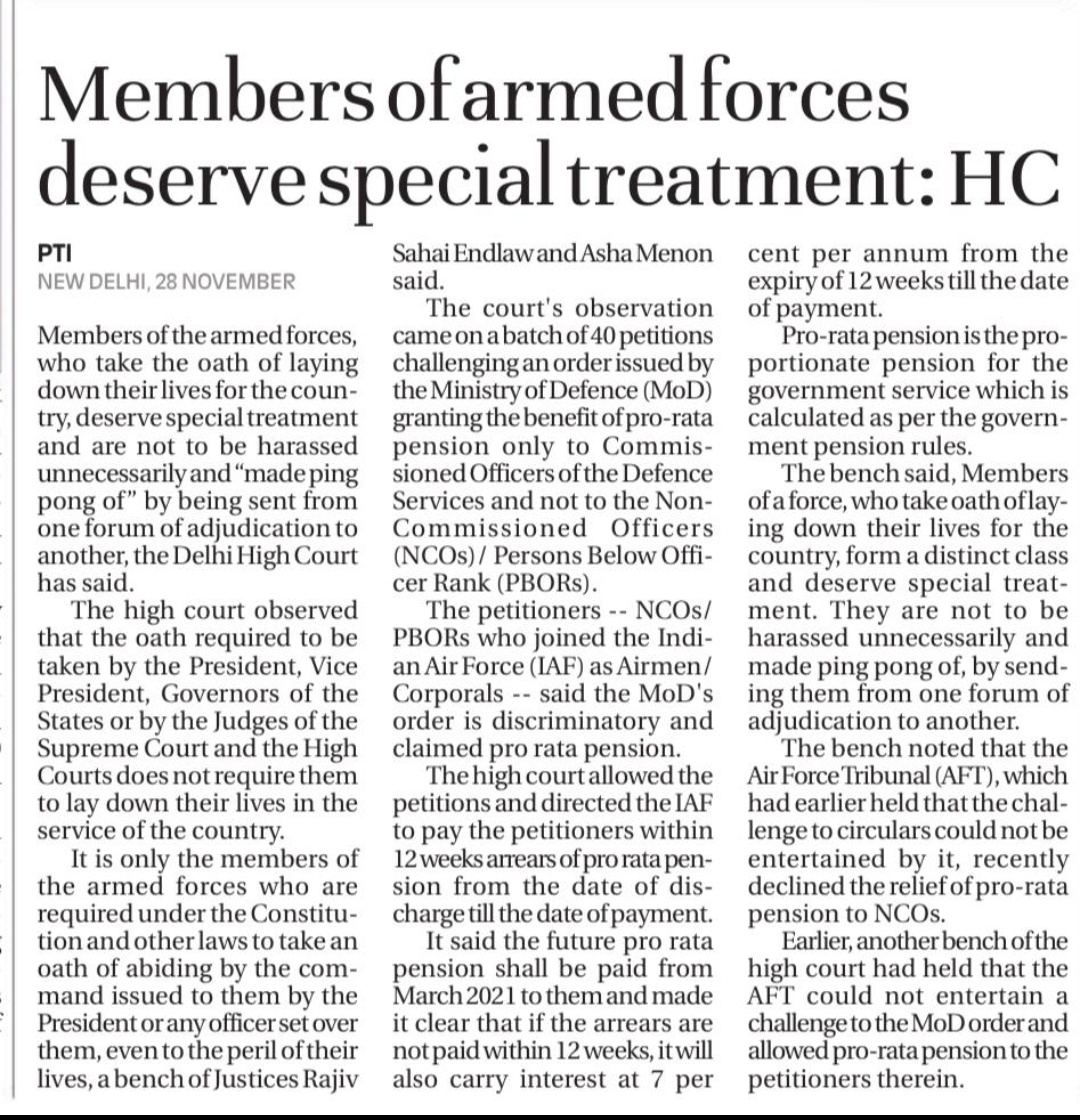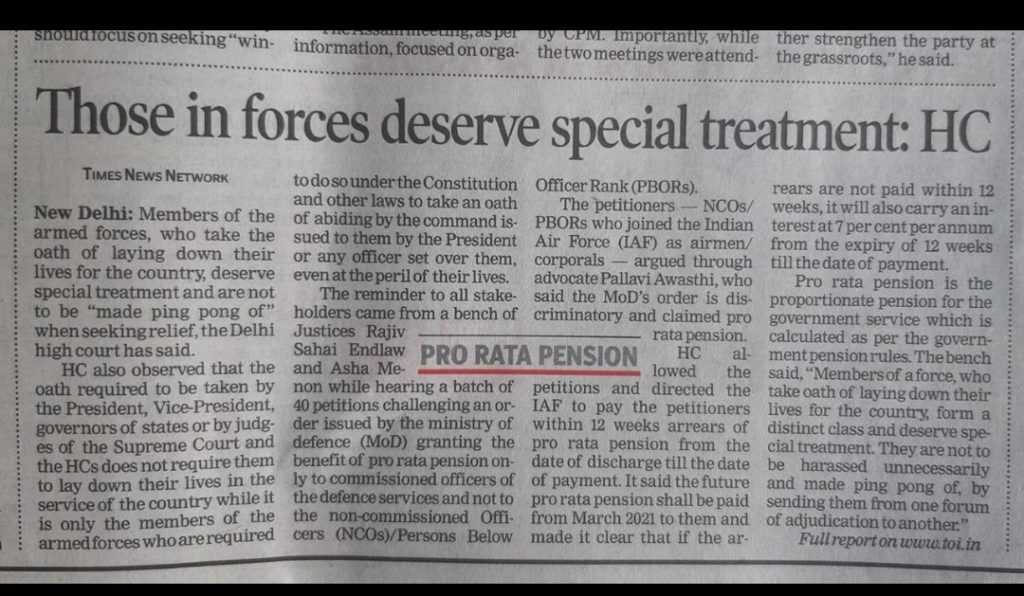
Members of Armed Forces cannot be harassed unnecessarily and ping-ponged between judicial fora: Delhi High Court
The Bench termed the Indian Air Force’s refusal to grant pro-rata pension to the petitioners a sheer act of harassment of ex-servicemen and an abuse of the process of the Court.
Aditi Singh
Nov 26, 2020, 8:18 PM IST
Members of the Armed Forces are not to be unnecessarily harassed and “made ping pong of” from one forum of adjudication to another, the Delhi High Court recently said (Brijlal v. Union of India).
The order passed by a Division Bench of Justice Rajiv Sahai Endlaw and Asha Menon reads,
“Members of a force, who take oath of laying down their lives for the country, form a distinct class and deserve a special treatment. They are not to be harassed unnecessarily and made ping pong of, by sending them from one forum of adjudication to another.”
It was also held that the Armed Forces Tribunal is bound by the decisions of the High Court under the principles of stare decisis (precedent).
The Court was dealing with a batch of petitions challenging an order issued by Union Ministry of Defence (MoD) granting the benefit of pro-rata pension only to Commissioned Officers of the Defence Services and not to the Non-Commissioned Officers (NCOs)/Persons Below Officer Rank (PBORs).
The petitioners before the Court were NCOs/PBORs who joined the Indian Air Force (IAF) as Airmen/Corporals.
While dealing with the same issue, a Division Bench of co-ordinate strength in Govind Kumar Srivastava v. Union of India had held that the Armed Forces Tribunal (AFT) could not entertain a challenge the MoD order and allowed pro-rata pension to the petitioners therein.
In view of this order, over the last five months, other benches of the High Court allowed a large number of similar petitions on the very first day they came up before the Court. It was directed by these benches that if the petitioner/s, on verification, were found to be similarly situated as the officers in Govind Kumar Srivastava, they would be granted pro-rata pension.
However, while dealing with the present case, the Court found that the AFT had been declining the relief of pro-rata pension to NCOs.
Although the IAF sought to distinguish the order passed by the High Court from the orders passed by the AFT, the High Court refused to form a view any different from that of the co-ordinate Bench in Govind Kumar Srivastava.
The Court also rejected the Central government’s plea to transfer the present batch of the petitions to the AFT for adjudication.
Acknowledging the oath taken by the petitioners, even to the peril of their lives, the Court said,
“The petitioner/s in all these petitions are members of the Armed Forces who are the only ones required under the Constitution of India and under the laws, to take an oath, of abiding by the command issued to them by the President of India or by any officer set over them, even to the peril of their life. The oath required to be taken, neither by the President of India or by the Vice President of India or by the Governors of the States or by the Judges of the Supreme Court and the High Court requires them to lay down their lives in the service of the country.”
The Court added that the members of the Armed Forces put their lives to high risk and thus, the country owed respect and gratitude to them.
Coming to the present case, the Bench held that the IAF’s refusal to grant pro-rata pension to NCOs, in violation of the law laid down by the Court, was a sheer act of harassment.
“…(IAF’s refusal is) a sheer act of harassment of ex-servicemen, forgetting the oath given to them and while demanding fulfillment of such oath, compelling the petitioners to approach this Court and wanting to repeatedly contest the same issue. Such action of the respondents IAF, we find to be in abuse of the process of the Court.”
The Court added that it was “rather surprised” that although the AFT was bound by the law laid down by the High Court, it had taken a contrary view.
Calling the AFT’s conduct as “adventurism”, the Court said,
“Once the orders of the AFT are subject to judicial review by this Court, if AFT were to continue to pass orders disregarding the law laid down by the High Courts, the same would result in chaos, with petitions under Article 226 being filed in the High Courts terming such orders of the AFT as patently illegal and would defeat the principle of stare decisis and purpose of tribunalisation i.e. of expeditious disposal of disputes of personnel of the Armed Forces.”
The oath required to be taken, neither by the President of India or by the Vice President of India or by the Governors of the States or by the Judges of the Supreme Court and the High Court requires them to lay down their lives in the service of the country.
Delhi High Court
IAF sought to reason that award of pro-rata pension carried a huge financial burden of Rs 44 crore per month and of Rs 250 crore in payment of arrears.
The Court, however, said that the same could not come in the way of the implementation of its earlier order, as the State could not take a plea of financial burden to deny the payment of legitimate dues.
The petitions were accordingly allowed with a direction to the IAF to pay arrears of pro-rata pension to the petitioners in a time-bound manner.




